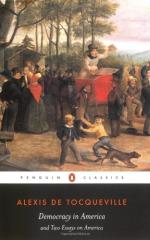
|
| Name: _________________________ | Period: ___________________ |
This test consists of 15 multiple choice questions and 5 short answer questions.
Multiple Choice Questions
1. Lawyers are connected to the aristocracy by their personal interest and what?
(a) Reasoning.
(b) Friends.
(c) Education.
(d) Culture.
2. De Tocqueville compares equality to what weapon?
(a) A spear.
(b) A double-edged sword.
(c) A bow and arrow.
(d) A dagger.
3. Before the American Revolution, what were the two great political parties?
(a) The Federalist and the State parties.
(b) The Federalist and the Republican parties.
(c) The Federalist and the Democratic parties.
(d) The Federalist and the Anti-Federalist parties.
4. The people in a democracy instinctively acknowledge that the interest of the many is more valuable than that of whom?
(a) The monarchy.
(b) The wealthy.
(c) A privileged few.
(d) A small but active minority.
5. American settlers imported most of their technical language from where?
(a) Europe.
(b) Asia.
(c) Canada.
(d) France.
6. What does de Tocqueville say religion participates in keeping the social effects of on a leash?
(a) Democracy.
(b) Capitalism.
(c) Egalitarianism.
(d) Socialism.
7. American literature is made up of the two extremes of what, according to de Tocqueville?
(a) Reality.
(b) Passion.
(c) The world.
(d) Imagination.
8. De Tocqueville observes that judges are not elected, but are what?
(a) Endowed.
(b) Called.
(c) Installed.
(d) Appointed.
9. In what does de Tocqueville say American writers find poetry?
(a) Intellect.
(b) The mundane.
(c) The nation.
(d) Passion.
10. About what does de Tocqueville believe aristocrats are busy writing?
(a) Life.
(b) Unique nations.
(c) Humankind.
(d) Mundane matters.
11. Where were the first colonies established?
(a) Delaware.
(b) New England.
(c) Virginia.
(d) New Haven.
12. To a democratic writer, truth cannot emanate from a human simply because the human does what?
(a) Holds power.
(b) Has logic.
(c) Exists.
(d) Is of the majority.
13. What kind of impact does the American press have on its people?
(a) Large.
(b) Small.
(c) Huge.
(d) Medium.
14. When American writers exaggerate the importance of a subject, de Tocqueville says it gets lost in what?
(a) The world.
(b) Oblivion.
(c) Space.
(d) The clouds.
15. According to de Tocqueville, the population of America is typically oblivious to the development of what?
(a) Religion.
(b) Philosophy.
(c) History.
(d) Mathematics.
Short Answer Questions
1. Because of the generally accepted principle of equality among Americans, according to de Tocqueville they are less likely to accept what?
2. Democratic regimes value what over heroism?
3. According to de Tocqueville, equality can enable what?
4. According to de Tocqueville, freedom cannot be what?
5. On what type of sovereignty does democracy rely?
|
This section contains 378 words (approx. 2 pages at 300 words per page) |

|




